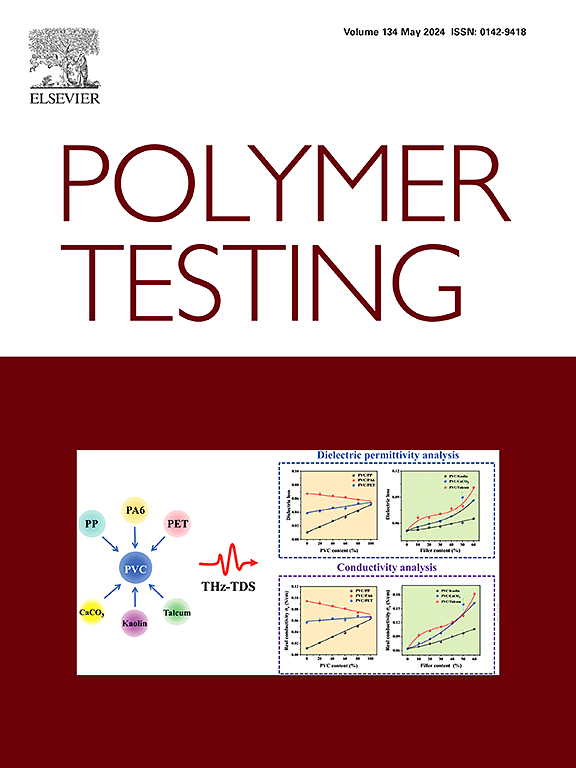具有聚氯乙烯复合材料增韧作用的核壳纳米树脂MWCNTs@acrylic的机械化学合成
IF 5
2区 材料科学
Q1 MATERIALS SCIENCE, CHARACTERIZATION & TESTING
引用次数: 0
摘要
聚氯乙烯(PVC)本质上是一种脆性材料,在保持其机械性能的同时,使用最少的填料来增强其韧性仍然是一个重大的研究挑战。采用机械化学方法合成了包覆丙烯酸树脂(ACR)的多壁碳纳米管(MWCNTs),并对其增韧PVC的效果进行了研究。首先,通过原子转移自由基聚合将甲基丙烯酸甲酯(MMA)接枝到MWCNTs上,提高MWCNTs与ACR的相容性。随后,利用一种简单、环保的机械化学方法制备了MWCNTs@ACR核壳纳米颗粒。FTIR和TEM分析证实了成功的接枝和涂层工艺。经TG测定,MMA的接枝效率为13.6%,而ACR的接枝效率为22%。MWCNTs@ACR/PVC复合材料然后通过压缩成型制造,从而提高了强度,特别是增强了韧性。复合材料的冲击强度比PVC高592%,比简单的MWCNTs/ACR/PVC共混物高303%,同时保持了复合材料的强度。这一改进是由于MWCNTs和PVC基体之间的界面相互作用增强,以及MWCNTs在基体中的良好分散。本文章由计算机程序翻译,如有差异,请以英文原文为准。
Mechanochemical synthesis of core-shell MWCNTs@acrylic resin nanoparticles with toughening effect on PVC composites
Polyvinyl chloride (PVC) is inherently a brittle material, and enhancing its toughness while preserving its mechanical properties with minimal use of fillers remains a significant research challenge. In this paper, multi-walled carbon nanotubes (MWCNTs) coated with acrylic resin (ACR) were synthesized using a mechanochemical approach, and their effectiveness in toughening PVC was investigated. Firstly, methyl methacrylate (MMA) was grafted onto MWCNTs via atomic transfer radical polymerization to improve the compatibility between the MWCNTs and ACR. Subsequently, MWCNTs@ACR core-shell nanoparticles were prepared using a simple, environmentally friendly mechanochemical method. FTIR and TEM analyses confirmed the successful grafting and coating processes. The grafting efficiency of MMA was found to be 13.6 %, while the ACR coating efficiency was 22 %, as determined by TG. MWCNTs@ACR/PVC composites were then fabricated via compression molding, resulting in improved strength, and, notably, enhanced toughness. The impact strength of the composite was 592 % higher than that of PVC and 303 % higher than that of a simple MWCNTs/ACR/PVC blend, while maintaining the composite's strength. This improvement is attributed to the enhanced interfacial interaction between the MWCNTs and the PVC matrix, as well as the excellent dispersion of the MWCNTs within the matrix.
求助全文
通过发布文献求助,成功后即可免费获取论文全文。
去求助
来源期刊

Polymer Testing
工程技术-材料科学:表征与测试
CiteScore
10.70
自引率
5.90%
发文量
328
审稿时长
44 days
期刊介绍:
Polymer Testing focuses on the testing, analysis and characterization of polymer materials, including both synthetic and natural or biobased polymers. Novel testing methods and the testing of novel polymeric materials in bulk, solution and dispersion is covered. In addition, we welcome the submission of the testing of polymeric materials for a wide range of applications and industrial products as well as nanoscale characterization.
The scope includes but is not limited to the following main topics:
Novel testing methods and Chemical analysis
• mechanical, thermal, electrical, chemical, imaging, spectroscopy, scattering and rheology
Physical properties and behaviour of novel polymer systems
• nanoscale properties, morphology, transport properties
Degradation and recycling of polymeric materials when combined with novel testing or characterization methods
• degradation, biodegradation, ageing and fire retardancy
Modelling and Simulation work will be only considered when it is linked to new or previously published experimental results.
 求助内容:
求助内容: 应助结果提醒方式:
应助结果提醒方式:


